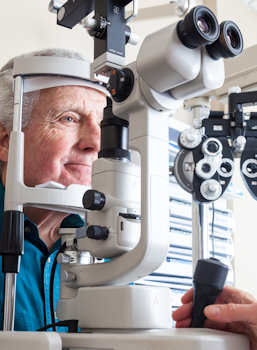Cataract Causes
A cataract is a clouding of the naturally clear crystalline lens inside the eye and is the leading cause of blindness in the world. Find out what causes cataracts and what can be done to treat them from the experts at Elmquist Eye Group.

Elmquist Eye Group has been serving the residents of Fort Myers, Cape Coral, and Southwest Florida for more than 25 years. Our talented team provides comprehensive eye care services to everyone in the family, from children to seniors.
- Meet board certified ophthalmologist Yasaira Rodriguez, MD
- Meet board certified optometrist (and partner) Kate Wagner, OD
- Meet board certified optometrist Nina Burt, OD
The Elmquist team takes a personal interest in every patient, skillfully diagnosing and treating a wide range of eye conditions. With over 50 combined years of experience in the optical field, we proudly offer a unique combination of state-of-the-art eye care and a passion for providing the highest level of service to our patients.
What Causes Cataracts to Form?
Cataracts are a natural part of the aging process, which means that all of us are at risk of eventually developing them.
The lens of the eye consists mostly of water and protein. As we age, the protein may begin to clump together and cause part of the lens to become cloudy. In the beginning, you may not notice a vision problem. However, as time goes on, the cataract may grow larger and cloud more of the lens, making it more difficult to read and perform other routine daily activities.
Although most cataracts are age-related, there are other types of cataracts. An injury to the eye can cause what is called a traumatic cataract. Certain diseases, such as diabetes, as well as some medications, including prednisone and corticosteroids, can cause cataracts to develop. And, although uncommon, babies can be born with cataracts or develop them during their first year of life.
How We Detect Cataracts
The first evidence of cataracts is usually discovered during an examination. A cataract examination is very much like a general eye exam, but we will dilate your pupils to thoroughly examine your eyes. Your eye doctor will also do a few extra tests, such as visual acuity and glare testing, to determine the severity of the cataract.
If cataracts are beginning to form, it’s important to make sure your glasses or contact lenses are strong enough to compensate for your impaired vision. As your cataracts develop further, you can discuss with your eye doctor whether surgery would be beneficial.
As a cataract worsens and activities like driving, reading and working on the computer become more difficult, you may decide it’s time to have it surgically removed. You are never too old to have cataract surgery!
Elmquist Eye Group now offers bladeless laser-assisted cataract surgery, which is designed to make the procedure even more precise, safe and accurate. While traditional cataract surgery provides excellent results, this revolutionary procedure enhances our ability to offer patients at Elmquist Eye Group the best possible visual outcomes.
Call Elmquist Eye Group at (239) 936-2020 to learn more about what causes cataracts and how we can restore your lost vision.
